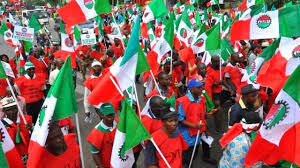For a long time, governments and the private sector have been relying on the reports of National Bureau of Statistics (NBS) without much ado.
However, the Nigeria Labour Congress (NLC) and Nigerian Association of Chamber of Commerce, Industry, Mines, and Agriculture (NACCIMA) have regarded the recent report of National Bureau of Statistics (NBS) as ‘a piece of lazy man’s job.’
NBS report released on Monday, November 25, Nigeria’s unemployment rate decreased to 4.3 percent in the second quarter (Q2) of 2024, down from 5.3 percent in Q1 2024. Additionally, the employment-to-population ratio rose to 76.1 percent, indicating an increase in the number of employed individuals within the working-age population.
Read also
- Akwa Ibom Among 20 Nigeria’s states that generated revenue from LGAs in 2023- NBS
- Imported food prices soar, hitting 34% in Nigeria, says NBS
- Nigeria’s Average Petrol Price Rose to N626.21 in Sept says NBS
NLC raised concerns over the credibility of a recent report by the NBS, which claimed a significant drop in the country’s unemployment rate.
NLC, represented by its national assistant general secretary, Chris Onyeka, has vehemently criticised the report. Speaking to Punch, Onyeka described the figures as a “voodoo document” that fails to mirror the harsh economic realities faced by Nigerians.
“Unemployment cannot be coming down in Nigeria when factories are closing shops,” Onyeka argued. “It cannot be coming down when there is increasing inventory and reduced consumer spending. If anything, unemployment is increasing.”
He further questioned the methodology employed by the NBS, calling it a “figment of imagination concocted by people who want to manipulate figures.” Onyeka challenged the bureau to provide concrete evidence of the sectors purportedly creating jobs, insisting the data was inconsistent with the prevailing economic landscape.
“Where are the jobs coming from?” he asked. “Is it from employers who are complaining of consumer resistance and slowing economic activities? It doesn’t add up. Once data does not reflect reality, it loses relevance.”
Onyeka accused the NBS of losing its credibility, likening its perceived failure to that of other national institutions, such as the Independent National Electoral Commission (INEC).
The NLC’s response underscores broader scepticism about official statistics in a nation grappling with economic challenges, factory closures, and reduced consumer purchasing power. The NBS has yet to respond to the NLC’s criticisms.
NACCIMA Faults NBS’ report
Similarly, the Nigerian Association of Chamber of Commerce, Industry, Mines, and Agriculture (NACCIMA) flayed the recent data released by the National Bureau of Statistics (NBS) indicating a 3.46% GDP growth and a drop in unemployment to 4.6% for Q3 2024.
In a statement released on Monday, NACCIMA’s National President, Dele Kelvin Oye, called for caution in interpreting the figures, citing the disconnect between the reported data and the harsh economic realities facing Nigerians.
“The data does not adequately consider critical factors such as rising taxation by sub-national entities, the implications of the 2024 tax bill, and regulatory barriers stifling local and foreign investments,” Oye stated.
He also noted the adverse effects of volatility in the oil and gas sector and insufficient collaboration between regulators and private investors, which he said undermine genuine economic growth.
Oye questioned the reported decline in unemployment, pointing out the pervasive issues of underemployment and informal unemployment.
“While the statistics suggest improvement, many graduates and skilled workers remain unable to secure meaningful employment. It is disheartening to equate a statistical reduction with actual economic recovery or job creation,” he added.
NACCIMA further criticised the economic strain caused by hyperinflation, frequent fuel price hikes, power shortages, and naira devaluation, which have severely impacted the cost of living for ordinary Nigerians.
He also noted the prohibitive borrowing costs, with commercial interest rates between 35% and 40%, as a major obstacle for businesses trying to contribute to economic growth.
Under the circumstances, NACCIMA described the NBS’s growth narrative as implausible and urged policymakers to address the operational challenges confronting businesses.
Oye stressed the need for a realistic approach to achieving sustainable development, warning that statistical growth must not overshadow the economic difficulties endured by millions of Nigerians.
He called for enhanced collaboration with the Private Sector.
“In light of the above, we urge the government and relevant authorities to engage more vigorously with the organized private sector, acknowledging their insights and addressing their concerns within the policy making process.
“It is essential that statistical reporting reflects the true economic conditions on the ground so that any growth can be measured not just in numbers but also in terms of real improvements to the quality of life and economic opportunities available to our citizens.”
He added, “In conclusion, while the NBS report might convey an optimistic narrative, we implore all stakeholders to consider the complexities and contradictions inherent in our economic landscape. It is only through an authentic understanding of these dynamics that Nigeria can aspire toward sustainable growth and development.
“We must recognise that mere growth that leaves 56% of Nigerians living in poverty, as reported by the World Bank in 2024, cannot be considered a success. Real growth necessitates a government commitment to supporting the private sector with appropriate policies and regulatory frameworks.”
It said, “We continue to offer our suggestions for reducing interest rates and stabilizing the Naira. It is vital that we work collaboratively toward collective success; anytime government missteps, it normally leads to widespread suffering, but with the right policies, we can achieve shared prosperity.
“We advocate for genuine growth—not merely self-congratulatory statistics from the NBS that may mask deeper issues, akin to applying a band-aid to cancer. Without addressing the root causes of economic malaise, we risk further deterioration in the long run,” Oye added.

